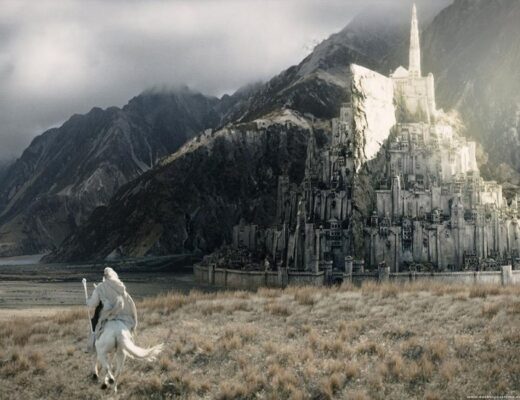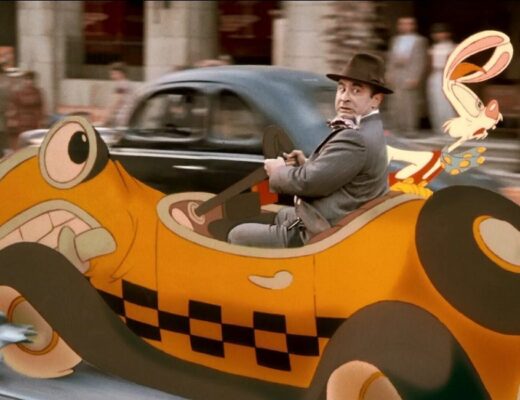Setting aside the relative quality of the movie itself, Gareth Edwards’ tech-heavy sci-fi epic The Creator is notable at the very least for not being based on some comic book or other franchise-hopeful intellectual property. At a time when debates continue to rage online about the state of cinema in the face of studio mega-budget programming, it’s nice to see someone take a risk on a pricey bit of genre storytelling that doesn’t come with prepackaged marketing and a mouth-breathing Reddit fanbase. That being said, probably the last word one might apply to The Creator is “original.” It’s tremendously derivative, not just narratively, but visually as well, and while that’s not intrinsically a bad thing, here all that retread mostly serves as shorthand in a drastically underwritten script that frequently seems as if it was just cobbled together as a clothesline for the admittedly terrific visuals.
It’s 2050. The AI defense system that protects the United States detonates a nuclear weapon in the heart of Los Angeles. Millions of lives are snuffed out in an instant, and the country declares war on artificial intelligence in all of its forms. (Sidenote: a fake newsreel suggests that robots have been competing alongside humans in competitive sports, which seems ridiculous given the absurd controversies we’re currently enduring over trans athletes — just a small example of the neat visual ideas presented here that can’t survive a moment’s scrutiny.) But then we go back 10 years earlier. We meet Joshua (John David Washington), a soldier who’s gone undercover in New Asia, where AI flourishes, to ferret out the enemy leader, someone or something called Nirmata. He’s in too deep though, as he has married the daughter (Gemma Chan) of a scientist suspected of being Nirmata, and she’s pregnant with his child. His betrayal is revealed, the Americans arrive with their flying fortress superweapon NOMAD, and proceed to blast the site from the sky. Joshua barely survives, believing his wife and child dead. Now, we jump ahead to 2065! Joshua is wracked with grief, guilt, and PTSD, but that doesn’t stop Colonel Howell (Allison Janney) from cajoling him to go on one last mission: they’ve located the enemy’s last-ditch weapon and need him to go in and destroy it, effectively ending the war. When he discovers that this “weapon” is in fact a human/AI hybrid child, a Last of Us-esque journey through a war-ravaged, tech-fantasy southeast Asia takes place as Joshua recalibrates his place in the conflict.
Nearly every element of The Creator is cribbed from something else. The space marines are straight out of Aliens; the superweapon base is basically the Death Star; the tech is a weird analog/digital mishmash that feels lifted from Blade Runner. Functionally, all of this tech introduces another instance of the illogical: the AI tech all confusingly use CRTs and big bulky equipment when we clearly see things like digital paper and other much slimmer, portable devices. It would make sense that the Americans would turn to analog in their quest to root out vulnerability to AI, only they haven’t. Like many details of the narrative, it feels entirely unreasoned. Nevertheless, it looks absolutely fantastic. The design might be a case of form over function, but its heavy Syd Mead influence is undeniably lovely to behold. Moreover, Edwards has done his best to use some truly astounding location photography to augment with all the VFX to create some indelible locations, like a mountaintop monastery for robot monks or a vast factory above a sleepy fishing village.
But despite the appeal of simply looking at the film, a bigger problem than its lack of originality is that the story itself simply doesn’t hang together. The identity of the titular Creator shouldn’t come as a surprise to anyone, but once that reveal has been made, it reframes the central personal conflict as a misunderstanding. That happens again when a throwaway line tells us that the war itself was started by accident. Edwards does his damnedest to let us know that the human side of the conflict is the aggressor, frequently likening their soldiers to the atrocity-committing U.S. troops in Vietnam, but it robs pretty much every character but Joshua of nuance. And even to that point, Joshua himself is defined mostly by fact of his trauma, and that’s not helped by Washington’s astonishingly blank performance. Edwards’ further attempts to add a spiritual dimension to all of this also fail spectacularly, mostly because they’re completely unexplored. We know the AI characters should be able to shed their constructed bodies — something that would resolve multiple parts of the narrative — but it’s the humans whose consciousnesses seem to be the most portable. Shots of cyborgs in Buddhist robes suggest ideas of impermanence and struggle against desire, but they are left hanging in this film about transformed bodies and souls in the data — a massive missed opportunity. The Creator might be a legitimate visual delight, but there’s no actual intelligence behind the machine.
DIRECTOR: Gareth Edwards; CAST: John David Washington, Madeleine Yuna Voyles, Gemma Chan, Ken Watanabe, Sturgill Simpson; DISTRIBUTOR: 20th Century Studios; IN THEATERS: September 29; RUNTIME: 2 hr. 13 min.







